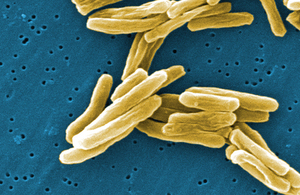PHE commits to tackling TB
PHE welcomes stakeholder comments on collaborative TB strategy published today for consultation to mark World TB Day.

Tuberculosis
To mark World TB Day Public, Health England (PHE) is today launching its collaborative tuberculosis (TB) strategy for consultation, aimed at bringing together best practice in clinical care, social support and public health to strengthen TB control.
The strategy includes PHE’s five-year ambition to see a sustained annual decrease in TB and a reduction in health inequalities associated with the disease, by ensuring action in all local areas with high rates of TB, to tackle the infection.
In 2012, there were 8,130 cases of TB reported in England, which is an incidence of 15 cases per 100,000 of the population. England now has the second highest TB rate in Western Europe and if current trends continue, will have more TB cases than the whole of the US within 2 years.
Drug resistant TB is also an increasing problem in England with cases of multi-drug resistant (MDR) TB increasing from 28 cases reported in 2000 to 78 in 2012, bringing the total number of cases reported since 2000 to 681.
The collaborative strategy proposes 10 priority areas for consultation by its key stakeholders and will finalise the priorities during the 3 month consultation process. These are:
- improving access and early diagnosis
- high quality diagnostics
- treatment and care services
- contact tracing
- vaccination
- tackling drug resistance
- new entrant latent TB infection (LTBI) screening
- surveillance and monitoring
- workforce strategy
Dr Ibrahim Abubakar PHE’s head of TB said:
Not enough is being done to combat the spread of this infection and we must do more. PHE is keen to lead colleagues in the fight against TB in England and today’s consultation announcement will mark the beginning of our 5 year ambition to make a real difference
Dr Paul Cosford, PHE’s director of health protection and medical director, said:
We need to take action. TB should be consigned to the past and yet it is occurring in England at higher rates than most of Western Europe. While the majority of cases are due to reactivation of infection, genetic coding shows evidence of recent transmission in England.
We must win the fight against TB – it is a very serious infection which is fatal in 1 in 20 cases. The treatment process is long and we want to stop people suffering from a disease which can be controlled with the right public health interventions.
Early detection and treatment is key to stopping the spread of TB and we will continue to work closely with our colleagues in the NHS, local government and the voluntary and community sector to take action to combat this public health problem.
Ends
Notes to editors
- Collaborative Tuberculosis Strategy for England, 2014 to 2019, for consultation
- Read the PHE tuberculosis in the UK report (2013)
- TB is an infection caused by bacteria. It usually affects the lungs, but can affect other parts of the body. TB is transmitted when someone who has the infection coughs or sneezes, but it requires close prolonged contact in order to spread from person to person. More information about tuberculosis
- Public Health England’s mission is to protect and improve the nation’s health and to address inequalities through working with national and local government, the NHS, industry and the voluntary and community sector. PHE is an operationally autonomous executive agency of the Department of Health.
UKHSA press office: National Infection Service
UKHSA press office, infectious diseases
61 Colindale Avenue
London
NW9 5EQ